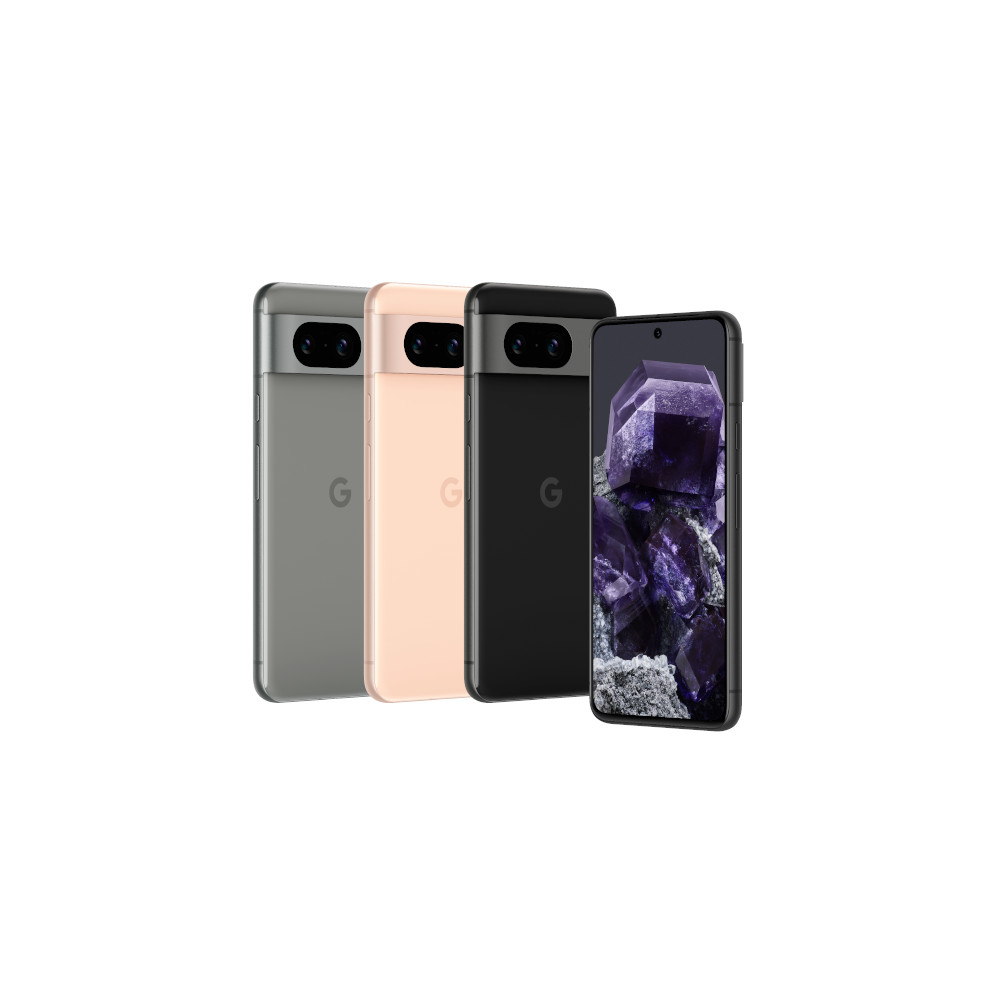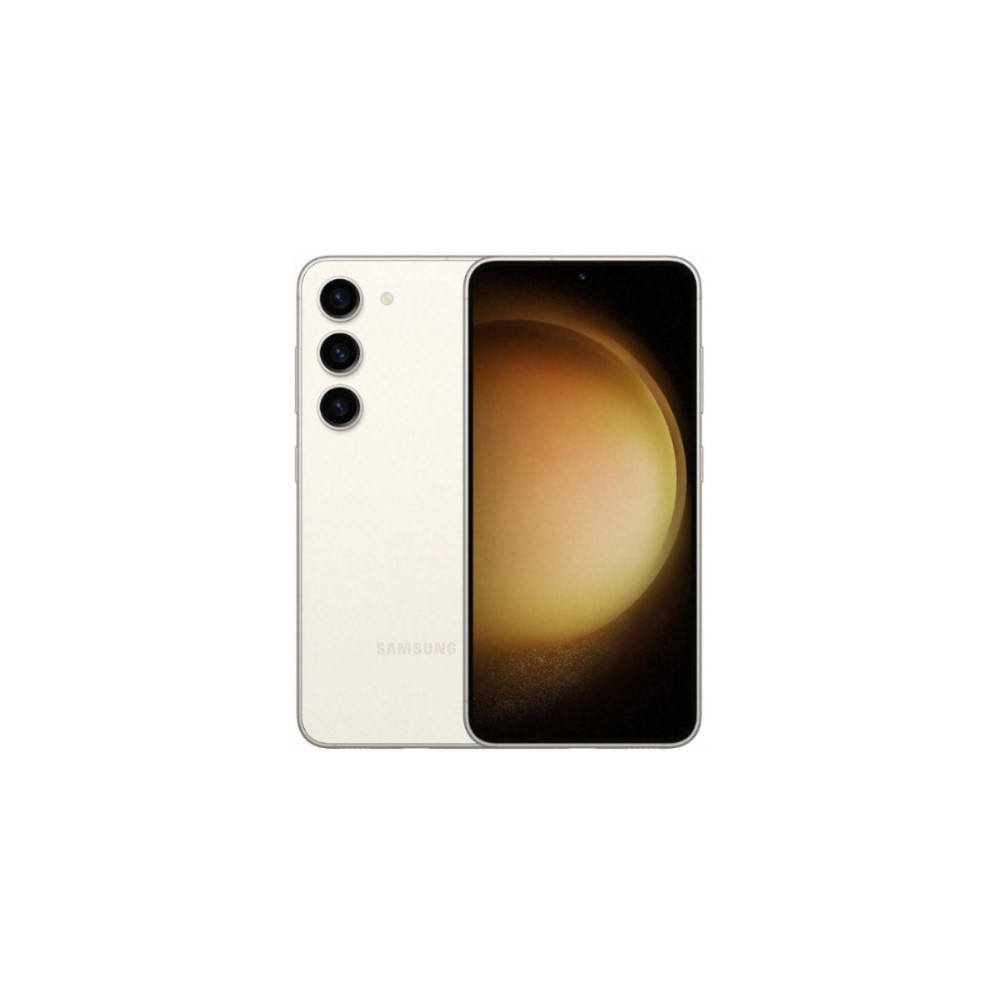Affiliate links on Android Authority may earn us a commission. Learn more.
Google Pixel 8 vs Samsung Galaxy S23: Which should you buy?
April 29, 2025
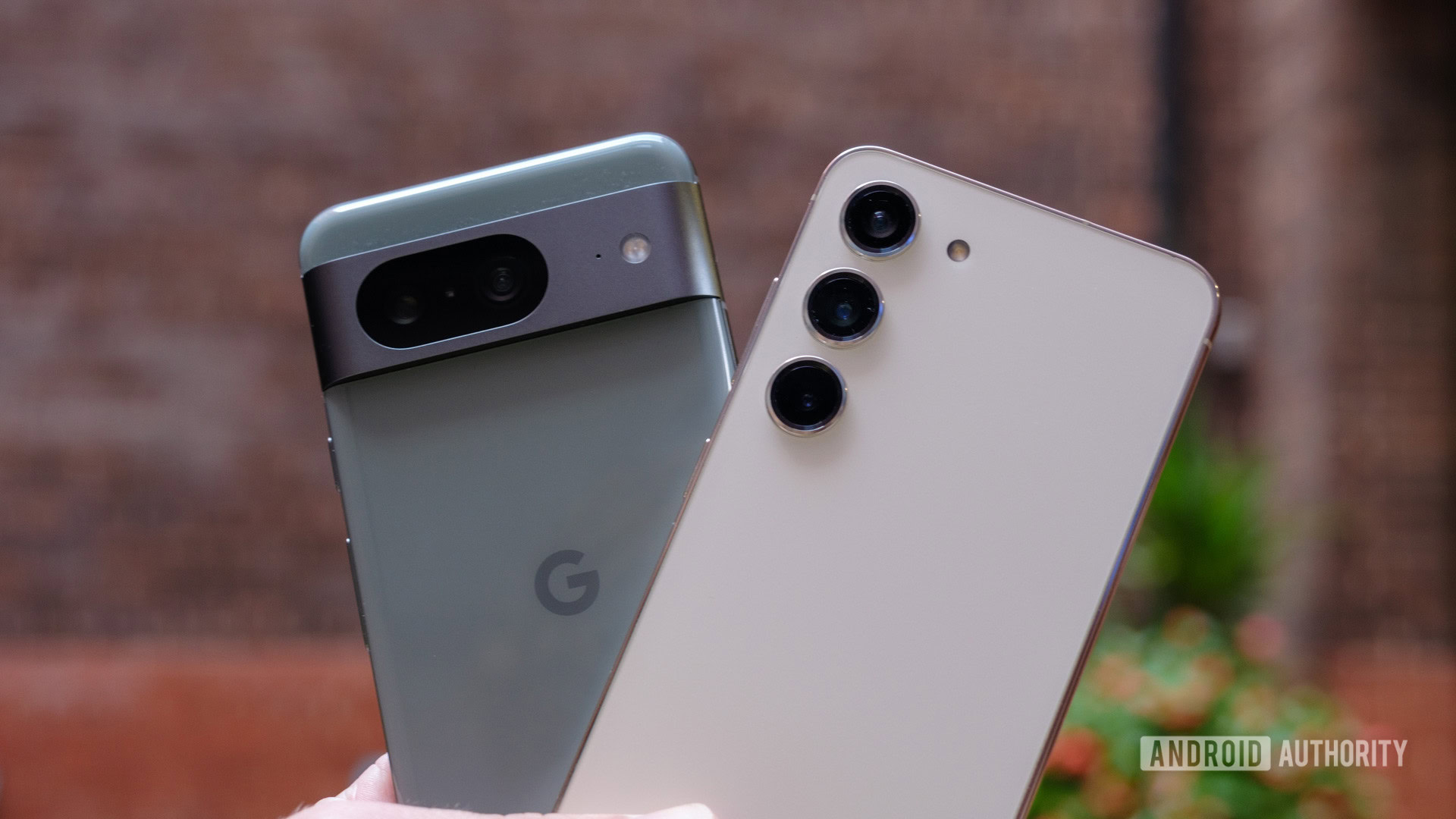
When it first debuted, the Galaxy S23 and Google Pixel 8 were two of the very best compact Android phones on the market. In 2025, we’d recommend moving to a Galaxy S25 or Google Pixel 9 instead. That said if you are thinking about getting one second-hand or are just curious about how we felt about the Galaxy S23 vs the Pixel 8 back in 2023, you can keep reading as we take a closer look at this Google Pixel 8 vs Samsung Galaxy S23 comparison.
Editor’s Note: This article was originally published in October of 2023 but has been updated with links to newer models and a few other changes to keep the article relevant to the times.
Google Pixel 8 vs Samsung Galaxy S23: At a glance
- The Galaxy S23 has a more powerful processor than the Pixel 8, though the latter has better AI and machine learning features.
- The Pixel 8 has a slightly larger display than the Galaxy S23.
- The Galaxy S23 is smaller and lighter than the Pixel 8.
- The Google Pixel 8 has a better software update policy than the Galaxy S23.
Google Pixel 8 vs Samsung Galaxy S23: Specs
| Pixel 8 | Galaxy S23 | |
|---|---|---|
Display | Pixel 8 6.2-inch OLED 2,400 x 1,080 resolution 428ppi 20:9 aspect ratio 60-120Hz refresh rate 1,400 nits brightness (HDR) 2,000 nits brightness (peak) HDR support Gorilla Glass Victus | Galaxy S23 6.1-inch Dynamic AMOLED Flat display 19.5:9 aspect ratio FHD+ resolution (2,340 x 1,080) 120Hz adaptive refresh rate 1200 nits brightness (HBM) 1750 nits brightness (peak) Gorilla Glass Victus 2 HDR support |
Processor | Pixel 8 Google Tensor G3 | Galaxy S23 Snapdragon 8 Gen 2 |
RAM | Pixel 8 8GB LPDDR5X | Galaxy S23 8GB LPDDR5X |
Storage | Pixel 8 128 or 256GB UFS 3.1 | Galaxy S23 128GB or 256GB UFS 3.1 - 128GB only UFS 4.0 - 256GB only |
Power | Pixel 8 4,575mAh (typical) 27W wired charging (USB-PD 3.0 PPS) Qi wireless charging | Galaxy S23 3,900mAh (typical) 25W wired charging 15W wireless charging |
Cameras | Pixel 8 Rear: - 50MP wide (1.2μm pixel width, ƒ/1.68 aperture, 82-degree FoV, 1/1.31-inch sensor, AF, OIS, EIS) - 12MP ultrawide (1.25μm pixel width, ƒ/2.2 aperture, 125.8-degree FoV, AF) - Single-zone laser-detect auto-focus (LDAF) sensor Front: - 10.5MP (1.22μm pixel width, ƒ/2.2 aperture, 95-degree FoV, FF) Camera app does not have pro controls | Galaxy S23 Rear: - 50MP wide (1.0µm pixel width, f/1.8 aperture, 1/1.56-inch sensor, 24mm, Dual Pixel PDAF, OIS) - 12MP ultrawide (1.4µm pixel width, f/2.2 aperture, 120-degree FoV, 1/2.55-inch sensor, 13mm, Super Steady video) - 10MP telephoto (1.0µm pixel width, f/2.4 aperture, 1/3.94-inch sensor, 70mm, PDAF, OIS, 3x optical zoom) Front: - 12MP wide (f/2.2, 26mm, Dual Pixel PDAF) |
Dimensions and weight | Pixel 8 150.5 x 70.8 x 8.9mm 187g | Galaxy S23 146.3 x 70.8 x 7.6mm 168g |
Video | Pixel 8 Rear: 4K (24, 30, or 60fps) 1080p (24, 30, or 60fps) Front: 4K (24, 30, or 60fps) | Galaxy S23 Rear: 8K (24 or 30fps) 4K (30 or 60fps) 1080p (30, 60,240 or 960fps) Front: 4K (30 or 60fps) 1080p (30fps) |
Audio | Pixel 8 Stereo speakers Triple-microphone Spatial audio support | Galaxy S23 Stereo speakers Triple-microphone Spatial audio support |
Ports | Pixel 8 USB-C 3.2 Dual-SIM (1x nano SIM and 1x eSIM) | Galaxy S23 USB-C 3.2 Dual-SIM (1x nano SIM and 1x eSIM) |
Security | Pixel 8 Titan M2 security chip Under-display fingerprint sensor Face Unlock (Class 3, highest tier) | Galaxy S23 Under-display fingerprint sensor Face Unlock |
Durability | Pixel 8 Gorilla Glass Victus (front and back) IP68 rating | Galaxy S23 Gorilla Glass Victus 2 (front and back) IP68 rating |
Connectivity | Pixel 8 - Wi-Fi 7 (802.11be/ax/6/6e) - MIMO - NFC - Bluetooth 5.3 | Galaxy S23 -Wi-Fi (802.11 a/b/g/n/ac/6e) - MIMO - NFC - Bluetooth 5.3 |
Software | Pixel 8 Android 14 7 years of OS upgrades 7 years of security patches 7 years of feature drops | Galaxy S23 Android 13 with ONE UI 4 years of OS upgrades 5 years of security patches |
Colors | Pixel 8 Obsidian (black), Hazel (blue-gray), Rose (pink) | Galaxy S23 Cream, Phantom Black, Green, Lavendar, Graphite, Lime |
In-box contents | Pixel 8 Google Pixel 8 USB-C to USB-C cable Quick Switch adapter SIM tool Paperwork | Galaxy S23 Samsung Galaxy S23 USB-C to USB-C cable SIM tool Paperwork |
At the heart of the Pixel 8’s experience is the Tensor G3 chipset, which is a pretty solid upgrade from the Tensor G2. There’s a next-gen ARM CPU, a more powerful GPU, a next-gen TPU, and new image sensor capabilities. As always, the Tensor’s primary focus is machine learning and AI over raw performance. It’s these special abilities that enable some of the Pixel’s coolest features like Magic Eraser, speech-to-text-translation, and its advanced photo and video processing.
If raw performance is more important to you, the Galaxy S23 takes a small lead here with its overclocked Qualcomm Snapdragon 8 Gen 2 SoC. Not only is this the fastest Qualcomm chip currently available, but it also has impressive thermals — something that is historically a struggle for the Tensor chip. It’s too early to say whether the Tensor G3 has resolved its predecessor’s overheating issues, but it’s very likely that the latest Snapdragon 8 still holds an advantage in this aspect.
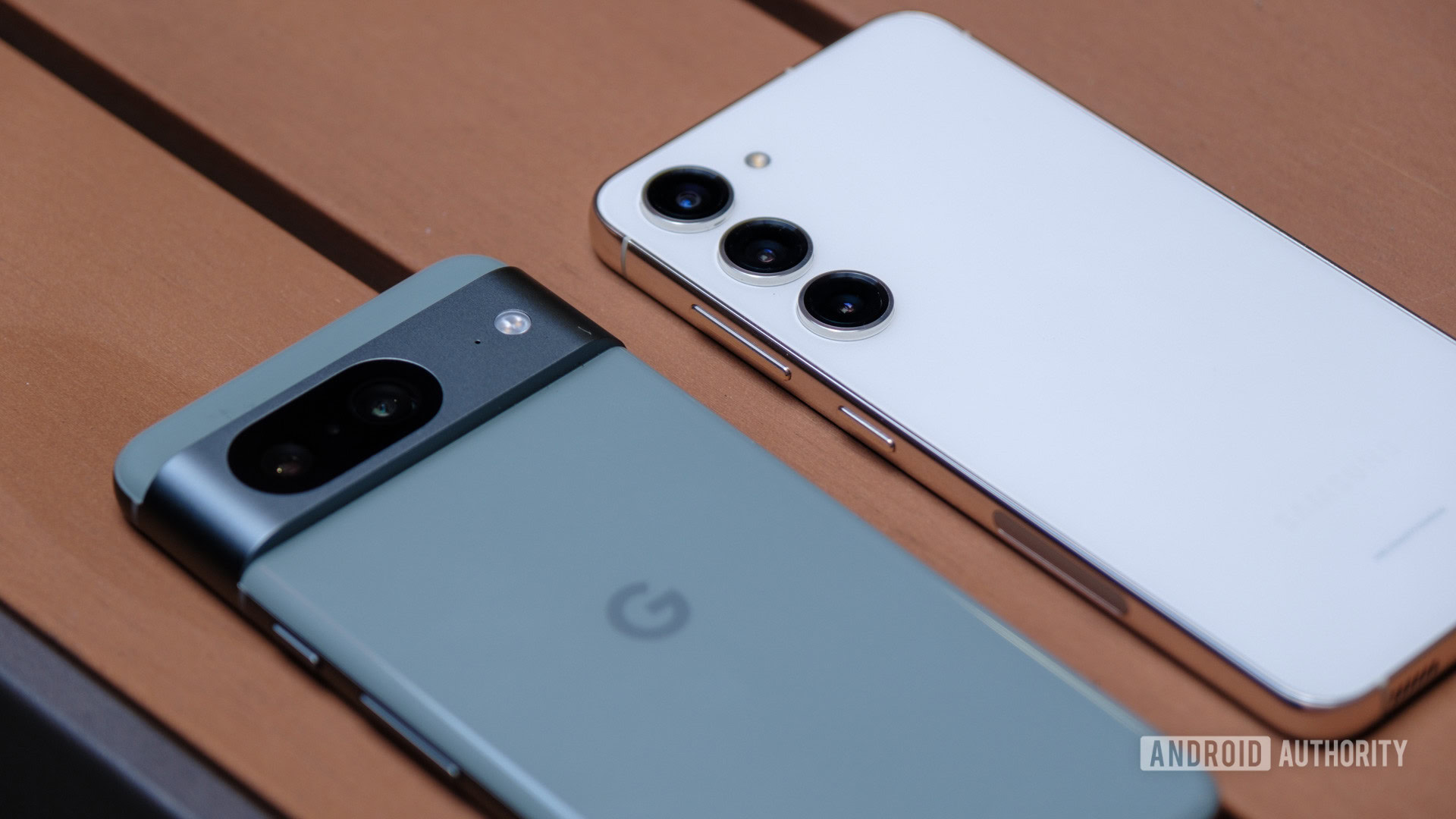
When it comes to games and high-performance apps, the Galaxy S23 will be the stronger performer. That said, it’s unlikely you’ll notice this in day-to-day use.
While we’ll talk more about the camera later, it’s important to note that the new front camera features Class 3 biometric capabilities, ensuring a highly secure face unlock experience comparable to the Pixel’s fingerprint scanner.
The displays aren’t too different on paper. The Pixel 8 packs a 6.2-inch OLED with a resolution of 2,400 x 1,080 and a 60-120Hz refresh rate. Meanwhile, the Galaxy S23 has a more compact 6.1-inch Dynamic AMOLED display with a resolution of 2,340 x 1,080 and 120Hz adaptive refresh rate.
The Galaxy S23 wins on performance, but the Pixel 8 edges ahead on its software update promise and exclusive features.
Samsung’s Dynamic AMOLED displays are known for extremely accurate colors and contrast, but it’s worth noting that Google also utilizes screens made from Samsung Display. The Pixel 8 has a slight advantage thanks to its 2,000 nits peak brightness versus 1,750 nits for the Galaxy S23. Both should perform well even in harsher outdoor lighting conditions.
The Samsung Galaxy S23 wins a few points for improved durability, thanks to its use of Gorilla Glass Victus 2 on the front and back. Samsung includes the latest glass on all its flagships, including the S23 Ultra. Conversely, Google reserves the latest glass for the Pixel 8 Pro, sticking to the original Gorilla Glass Victus for the Pixel 8. All of Samsung and Google’s flagships have the same IP68 rating for water and dust resistance, however.
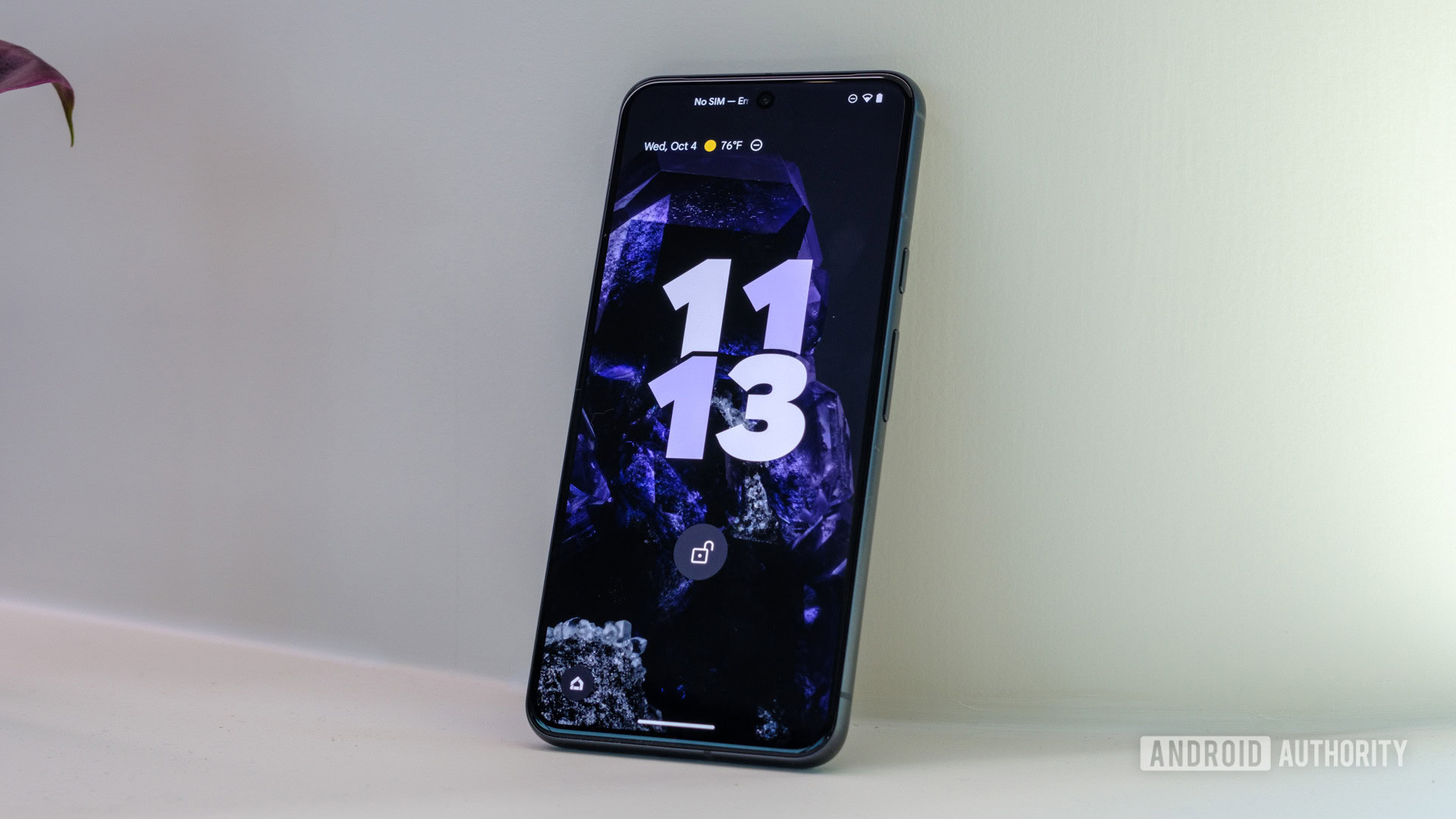
Let’s talk software. Google is known for its minimalist approach to Android. It sticks to a more stock-like skin on top of Android 14 while still adding its own special features to the mix. Samsung has a slightly heavier hand with its One UI software, though it’s still one of the best Android skins out there.
Software support is one area where Samsung has led the pack for a while now, offering four years of OS upgrades and five years of security patches. I always found this a bit ironic, given that Google is the developer behind Android. The good news is that Google is finally taking a stronger stance here, committing to an impressive seven years of OS updates, seven years of security patches, and seven years of Feature Drops for its OS.
Google Pixel 8 vs Samsung Galaxy S23: Design and size comparison
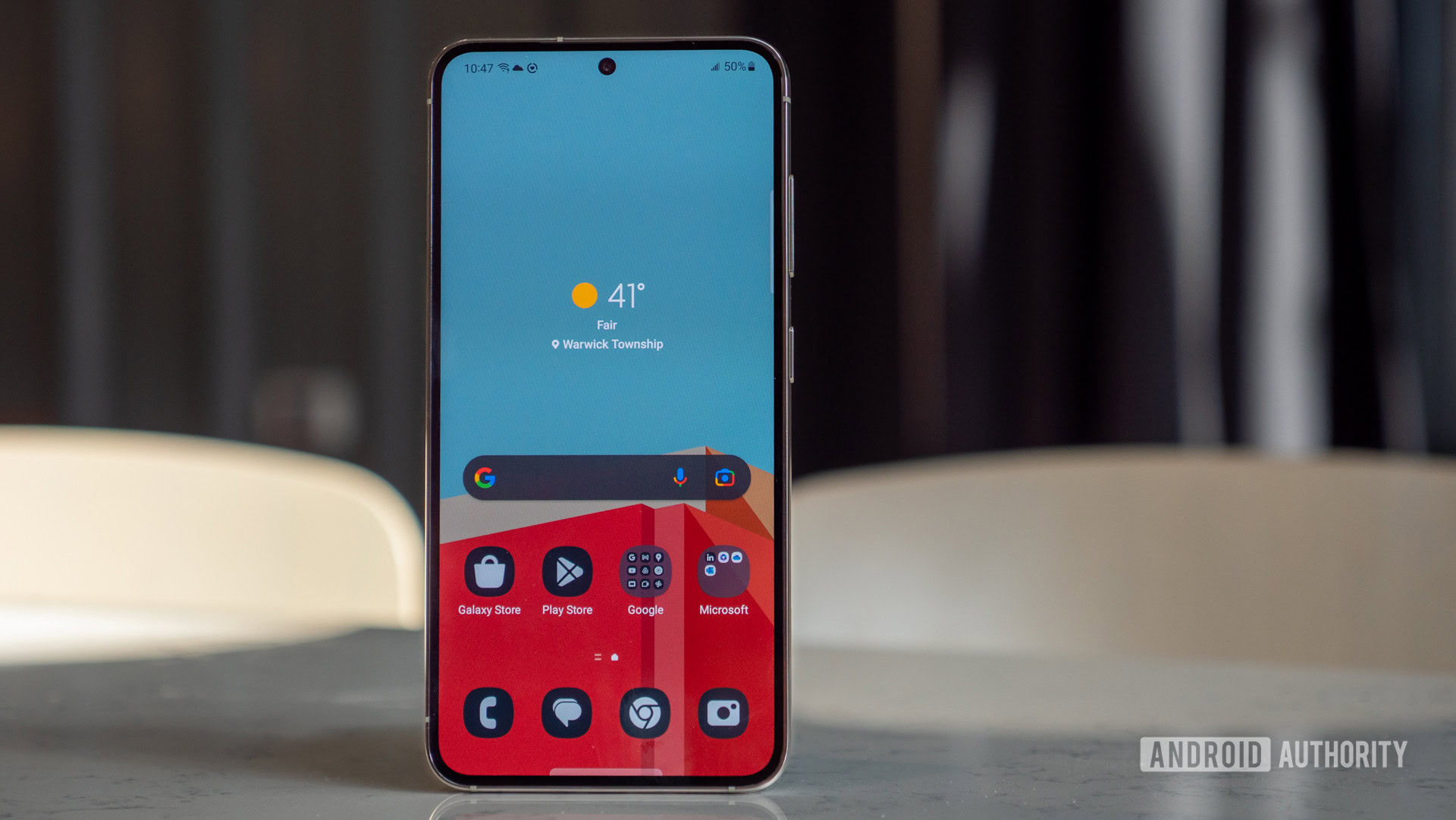
The Pixel 8 measures 150.5 x 70.8mm and has a thickness of 8.9mm. It’s quite a bit smaller than its predecessor, though it’s still slightly larger than the Galaxy S23, which comes in at 146.3 x 70.8 and has a thickness of 7.6mm. In terms of weight, the Galaxy S23 is also lighter at 168g compared to the Pixel 8’s 187g
Neither phone is massive, and both are going to feel pretty similar. Both phones should also be equally comfortable to use with one hand. If you don’t care about the size and weight differences, design could be a bigger factor.
Samsung and Google have distinct design languages, with the Pixel 8 arguably standing out more thanks to its unique camera bar that divides its glass rear into two. The Galaxy S23 has a cleaner and more minimalist approach to its rear design. It’s all one solid piece of glass with three camera bumps aligned on the upper left side.
Google Pixel 8 vs Samsung Galaxy S23: Camera
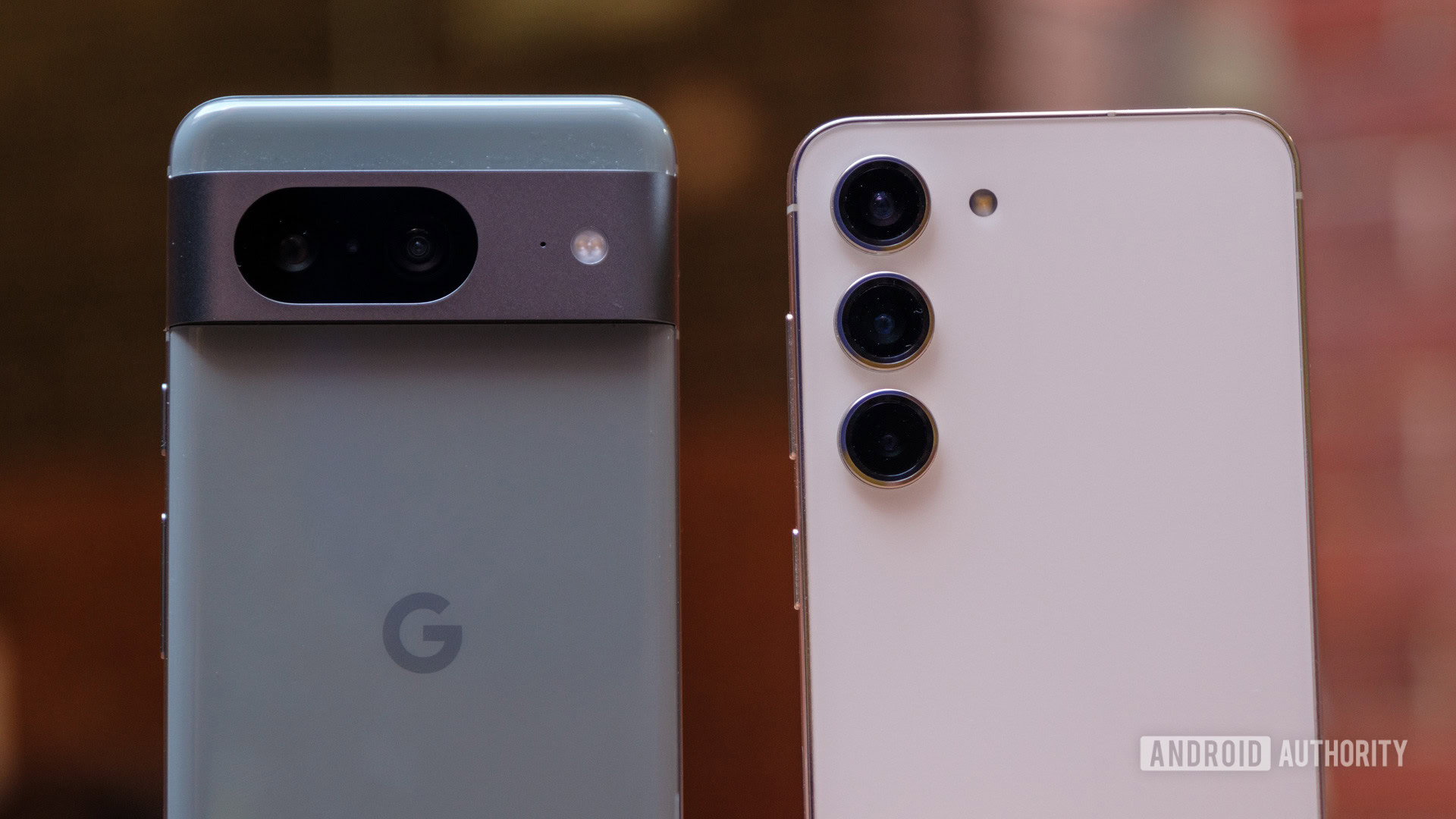
The Pixel 8 has a newer primary sensor than the Pixel 7 with a 50MP Isocell GN2. This sensor has a slightly wider aperture than its predecessor at ƒ/1.68, which should result in better, shaper images in good lighting. There’s also an improved 12MP ultrawide lens with a wider field of view at 125.8 degrees versus 114 degrees on the Pixel 7.
Even the selfie camera is seeing an upgrade, with a new 10.5MP shooter with an f/2.2 aperture, 95-degree FoV, and a 1.22μm pixel width. Probably the biggest change is the support for Class 3 biometrics, as mentioned above. This basically means Face Unlock finally has the same level of security as fingerprint scans.
Now, let’s turn our attention to the Galaxy S23’s camera.

The primary camera is a 50MP ISOCELL GN3 sensor with a 1/1.56-inch sensor and f/1.8 aperture. There’s also an ultrawide 12MP Sony IMX564 sensor with a f/2.2 aperture and 120-degree FoV. The Pixel 8 might not offer a telephoto lens, but the S23 sure does. The 10MP shooter can support 3x optical zoom and has an f/2.4 aperture. Lastly, the front camera is a 12MP shooter, more than capable of handling your selfie needs.
On paper, the Galaxy S23 has a few advantages over the Pixel 8, but remember that Google’s true camera mastery comes from its AI-based optimizations, not purely from its solid hardware. While it’s too early to form any concrete impressions of the Pixel 8’s camera, it appears poised to offer one of the best Android camera experiences to date.
Google Pixel 8 vs Samsung Galaxy S23: Battery life and charging
The Pixel 8 might be a bit smaller than its predecessor, but it went in the opposite direction for its battery size. The 4,575mAh battery is about 5% larger. We don’t have any details on the actual battery life just yet, though, judging by the Pixel 7, we’d expect it to make it through a full day’s use without much trouble.
The battery isn’t the only upgrade; there is also faster 27W wired charging with a compatible USB Power Delivery PPS wall charger. While it’s not as fast as many other Android phones, it represents a slight improvement over the Galaxy S23.
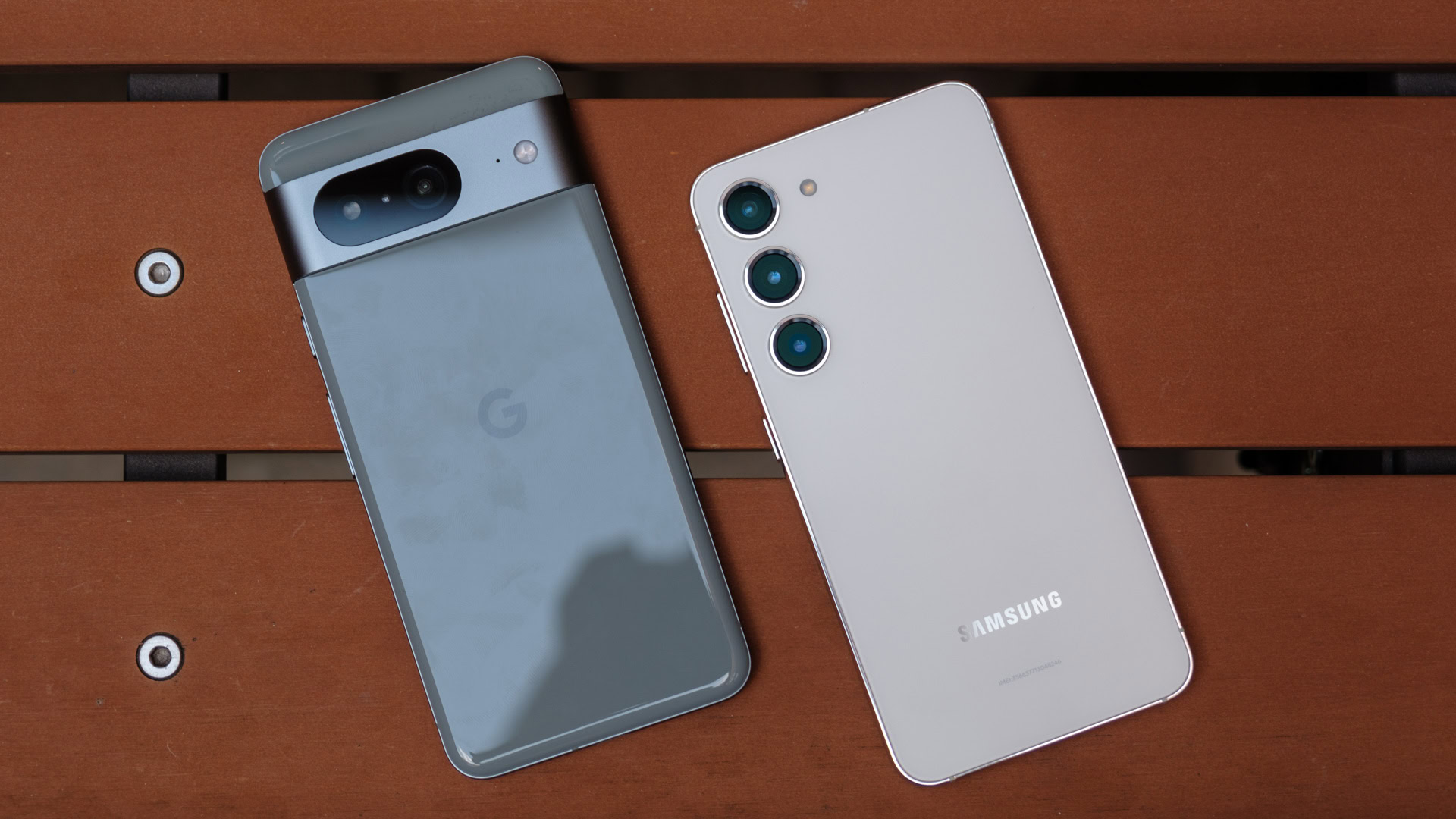
The Galaxy S23 boasts a relatively small 3,900mAh battery, but thanks to the power management capabilities of the Snapdragon 8 Gen 2, it manages to last longer than you might anticipate. Still, even with modest use, you’ll never make it more than just a single day. The 21W wired charging is also not exactly great, taking well over an hour and 30 minutes for a full charge.
In the realm of wireless charging, Google holds a slight advantage, offering 12W charging compatibility with any Qi-compatible charger and 18W charging when used with the second-gen Pixel Stand. In contrast, the Galaxy S23 caps 3rd-party chargers to just 10W, though Samsung-branded chargers will fare better at 15W.
Google Pixel 8 vs Samsung Galaxy S23: Price and availability
- Google Pixel 8: Starting at $699
- Samsung Galaxy S23: Starting at $799
For years, Google has positioned itself as the cheaper alternative to more expensive flagships, but the Pixel 8 has increased the Pixel 7’s starting price by $100. While this might be disappointing to some, it’s not entirely surprising given the current state of the economy. At $699, it’s still $100 cheaper than the Galaxy S23.
For those who want more color choices, the Galaxy S23 has an advantage with colorways of Cream, Phantom Black, Green, Lavender, Graphite, and Lime. However, it’s worth noting that some of these color options are limited to specific markets. The Pixel 8 is slightly more modest here, coming in Obsidian, Hazel, and Rose.
Google Pixel 8 vs Samsung Galaxy S23: Which should you buy?
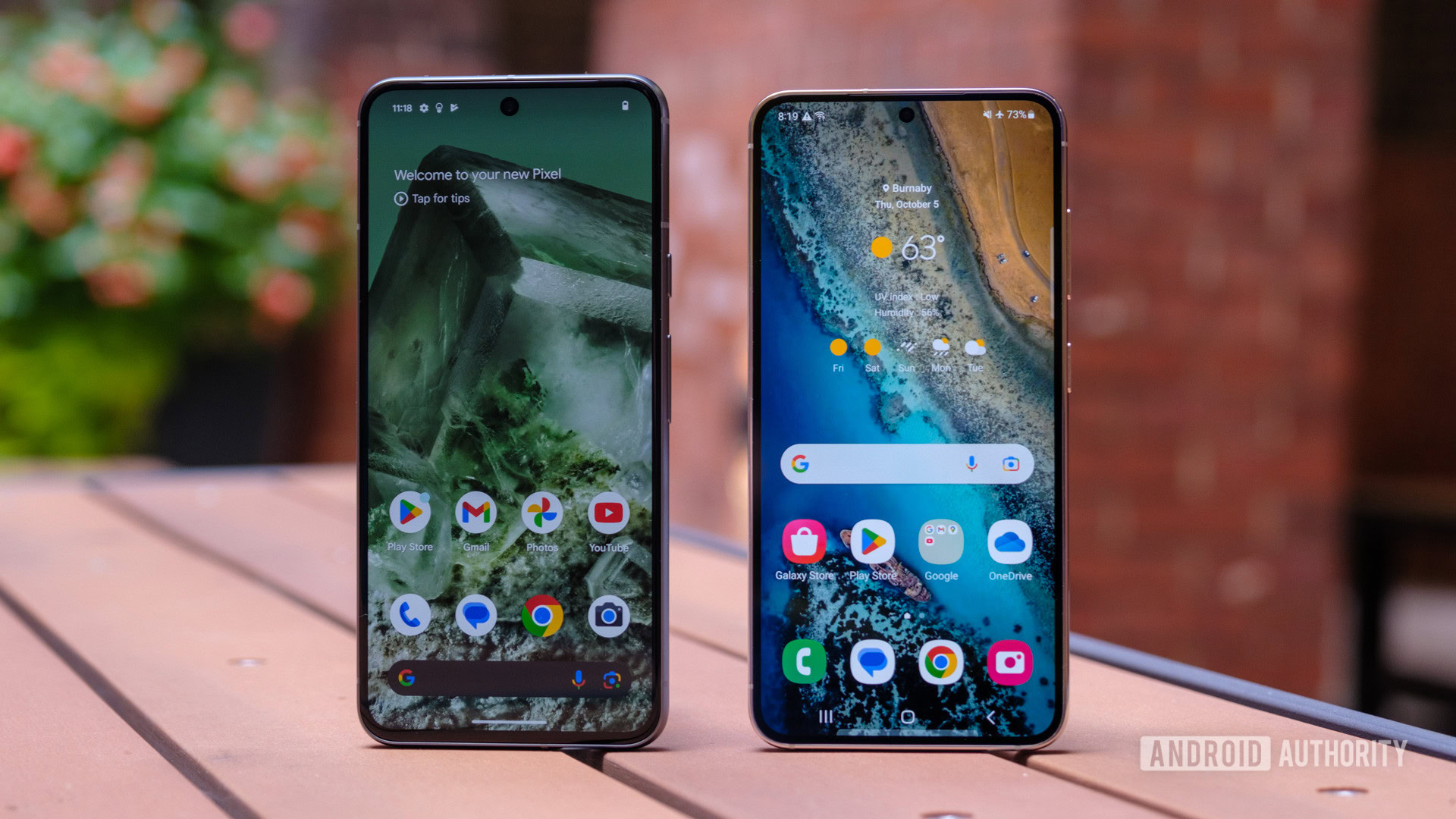
Again in most cases we’d consider the Pixel 9 or the Galaxy S25 over either of these two older devices in 2025. That said, if you are buying second hand, the Pixel 8 has a minimalist approach to software, a slightly more eye-catching design, and an extremely impressive commitment to software updates that means it’s still relevant today. It also has a decent camera, making it an excellent overall phone.
Should you get the Pixel 8 or the Galaxy S23?
Then again, some folks want a more heavy-handed software approach and enjoy Samsung’s kitchen sink level of high-end features. The Snapdragon 8 Gen 2 is also likely to be a bit more future-proof. If you aren’t into Google’s software and hardware design philosophy and don’t mind spending more, you’ll find the Galaxy S23 is likely the more powerful choice.
Both of these smaller phones pack plenty of punch, so it will come down to which one is more to your taste.
